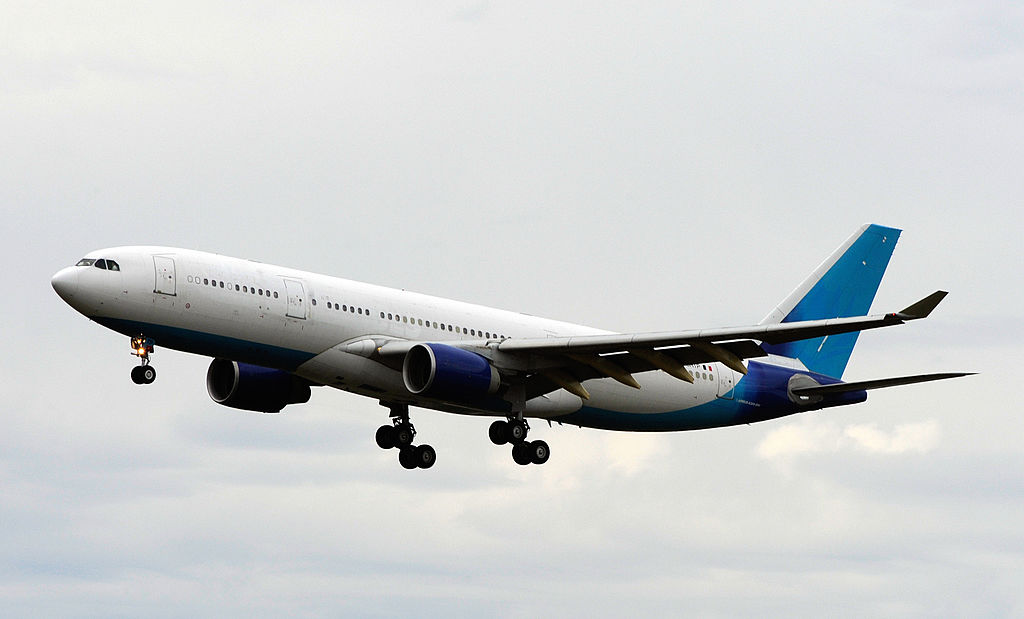Free seats in airplanes reduce exposure to covid-19 1:08
(CNN Spanish) -
At the beginning of the pandemic, according to a study published by the US Centers for Disease Control and Prevention, a passenger who did not wear a mask and had no symptoms of covid-19 infected 12 people who were traveling with him in business class, two people seated in economy class and a crew member on a 10-hour international flight.
Last summer, 13 asymptomatic people on an international flight to Ireland infected another 46 people in six regions of the country, despite the use of masks on the plane.
And in September, nine people tested positive after a flight from India to New Zealand, even though masks were mandatory on the plane.
Despite an investigation indicating that the risk of COVID-19 transmission on flights "is real," a Harvard University report published in October 2020 concluded that the risk of contracting COVID-19 on an airplane is rare. as long as people wear masks, airports use safety precautions, and planes have HEPA filters installed (not all have them).
How to fly safely one year after the covid-19 pandemic
What is a HEPA filter?
A HEPA or "High Efficiency Particulate Air" filter has a similar performance to those "used to keep air clean in hospital operating rooms and industrial clean rooms", according to an air purification guideline for aircraft cabins. the International Air Transport Association, IATA.
These filters can trap particles as small as bacteria and viruses.
Linsey Marr, a professor of civil and environmental engineering at Virginia Tech University who studies airborne transmission of COVID-19, previously told CNN that 'air travel safety could improve if airlines and manufacturers installed and used HEPA filters correctly on more airplanes. '
advertising
"Proper filtration is the key to air travel safety," said the expert.
And those HEPA filters can "capture more than 99% of the microbes in filtered air," says IATA.
"Filtered and recirculated air provides higher cabin humidity levels and lower particulate levels than outside air systems," he adds.
How dangerous is flying during a pandemic?
This is what we know and how to make it safer
How Do Aircraft Air Filters Work?
The aircraft cabin air system is designed to deliver 50% outside air and 50% recirculated air, according to IATA, and recycles between 15 and 20 cubic feet of total air supply per minute.
With these filters, "the total air supply is essentially sterile and free of particles," says IATA.
And the air circulation in the aircraft cabins is continuous, with the air always entering and leaving the cabin.
“The total air flow to the cabin is supplied at a bulk flow equivalent to 20 to 30 air changes per hour.
This provides temperature control and minimizes temperature gradients within the cabin, ”adds IATA.
American Airlines, for example, says that it has used HEPA filters since 1990 so that its users and crew "breathe clean air" at 9,000 feet, and recycle the air in the cabin "once every 2 to 4 minutes," according to its page. Web.
“As the filters purify the air inside the aircraft, fresh air enters the engine compressor outside.
“It then enters the air conditioning system and mixes with the filtered and recirculated air.
This mix results in a higher level of humidity in the cabin, providing a more comfortable experience for customers.
This mixing process also helps the environment, as mixing fresh air with recirculated air results in less fuel burn overall, ”he says on his website.
All large commercial aircraft, the kind that take travelers from coast to coast and to distant wonders across the sea, have built-in HEPA filters to disinfect the air exhaled by passengers.
The recirculated air is usually mixed 50% with cooled air from the engines and injected into the cabin several times per hour.
The world's busiest airports and how much they have fallen during the pandemic
Not all planes have HEPA filters
Not all aircraft in service today have HEPA filtration.
Private leisure jets, puddle jumpers used to transport people to Alaska, Canada and other remote locations, and many small jets rented or chartered by companies to transport their executives between meetings are not HEPA filtered.
Regional airlines around the world can also use older jets, turboprops, and piston-engine airplanes originally built without HEPA filters to round out their fleets, transporting thousands of travelers to regional destinations or to larger airline terminals to make connections.
In the United States, regional airlines transport more than 40% of travelers each year, according to the Association of Regional Airlines (RAA), and constitute the only passenger air service in 63% of the country's airports.
Many of these smaller aircraft, including regional aircraft, do not need HEPA filters to purify cabin air because it is never recirculated - air is constantly being renewed from outside the aircraft during flight.
The air, often called the "fresh air system", is heated by the engines, destroying many impurities, before being cooled down and entering the cabin.
However, several small aircraft recirculate passenger exhalations, causing airlines that do not have HEPA filters on some aircraft to struggle to adapt their fleets.
- With information from CNN's Sandee LaMotte.
Covid-19

